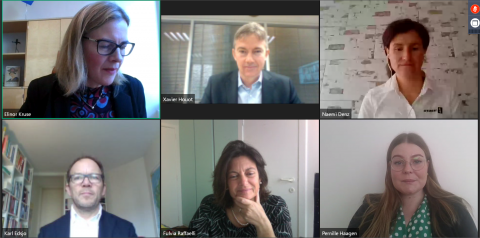A Circular Economy supporting Europe’s Green Deal ambition
19 October 2020

The new Circular Economy Action Plan has a crucial role to play in making Europe climate-neutral by 2050 and can help create opportunities for industrial leadership. How to ensure it succeeds? This was the focus of the latest in Orgalim’s series of Industrial Strategy in Focus roundtable sessions this Wednesday, which brought together policy makers, industry representatives and the NGO WWF to discuss what is needed to move Europe closer to an effective and workable circular economy.
Opportunities for European industrial leadership
Orgalim’s DG Malte Lohan opened the discussion and confirmed Europe’s technology industries very much welcome the Circular Economy Action Plan. "A more circular economy will make the transition to climate neutrality faster and more cost effective, and also help to optimise the use of energy and resources, which are such a massive cost to industry," he stressed.
Lohan also pointed out that Europe’s technology industries are facing the worst downturn since World War 2 due to the coronavirus crisis. “Given how far the new Circular Economy Action Plan reaches, this makes it really critical that we make the right policy choices, both for the environment and for industry.”
If Europe gets this right, we think we can create opportunities for industrial leadership that will also accelerate our global competitiveness.
No additional obstacles
Fulvia Raffaelli, Head of Unit on Circular Economy and Construction, DG GROW, echoed Lohan’s view that the green transition, in which the circular economy plays a key part, "is not only an environmental necessity, but it is also indeed a competitive opportunity for our industries.” Paradoxically, the current economic crisis Europe is facing makes this opportunity even more important, she pointed out.
Notably, she recognised that Europe’s technology industries play a key role in the transition to a sustainable future. They are already on the journey of improving sustainability and stressed that the idea is to accelerate and reward those who are already investing in this direction, not to create additional obstacles. “I can assure you that there is a lot of effort going into ensuring that what we’re working on will be, not only full compatible, but also exploiting synergies with existing legislation and instruments already available."
In addition he emphasised the need for safety, pointing out that “in our sector, we are super cognisant of the risks of ill-management of electrical products: in my home, I don’t want to be using a second-hand circuit breaker and have it not trip when I need it.” And he echoed the need for some financial incentives to lower the breakeven of certain circular models.
Naemi Denz, Director of Strategic Projects at STEINERT GmbH, also highlighted digital infrastructure as one of the key enablers to get more circular economy done. She gave the example that STEINERT makes smart machines that can sort different types of plastics but, in order to use them, the customer has to have the necessary digital infrastructure. And “if I have a wish for the policy makers,” she said, it is that, when talking about the product passport and digitalisation, "please don’t search on your own for the solution: there are so many standards regarding the digital passport... where we have data space and where we have defined information which can be used."
Speaking from the NGO perspective, Pernille Haagen, Circular Economy and Materials Advisor at World Wildlife Fund (WWF), emphasised the need for an integrated approach to designing sustainable products, since up to 80% of a product’s environmental impact are actually determined at the design phase. "Design innovation and waste management must work together within a system where all impacts and values are considered."
We have a very ambitious objective and we now need to go into a very pragmatic process where we also check with you what is feasible and what is not feasible.
A pragmatic process
Before concluding, the moderator, Elinor Kruse, Director of Environmental Policy at Teknikföretagen and Chair of Orgalim's Environmental Sustainability Working Group, revealed some of the headline recommendations from Orgalim’s new Position Paper, emphasising the need for harmonised circular economy measures within Europe, to follow the Better Regulation principles and to conduct impact assessments for all new announced initiatives and to ensure any new circular economy measure is accompanied by robust market surveillance and effective enforcement. “The stronger the EU single market, the better for the circular economy,” she stressed.
Looking forward, all participants welcomed the opportunity for continued dialogue between policy makers, NGOs and industry including SMEs, as well as other stakeholders.
You can access the full recording of the roundtable here.
Read below and download Orgalim’s Executive Summary of the key areas for consideration for Europe’s technology industries and Orgalim’s main recommendations on the new Circular Economy Action Plan. Further information can be found in Orgalim’s detailed Position Paper which provides our detailed views and recommendations on the various initiatives announced in the new Circular Economy Action Plan.

LATEST NEWS
How can we create a dynamic, competitive European high-tech manufacturing base?
Orgalim's key recommendations offer policymake...
